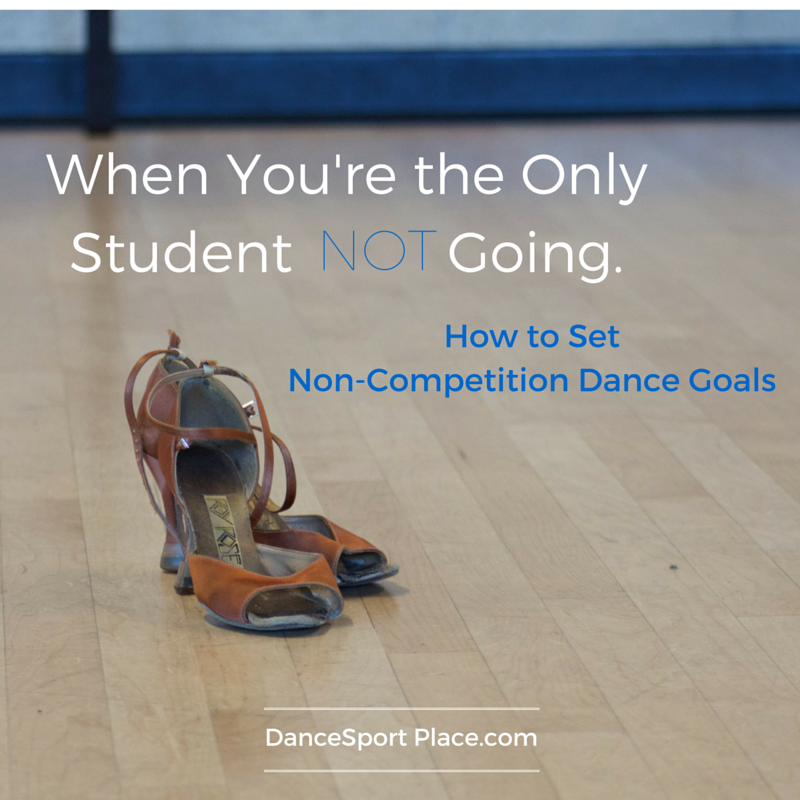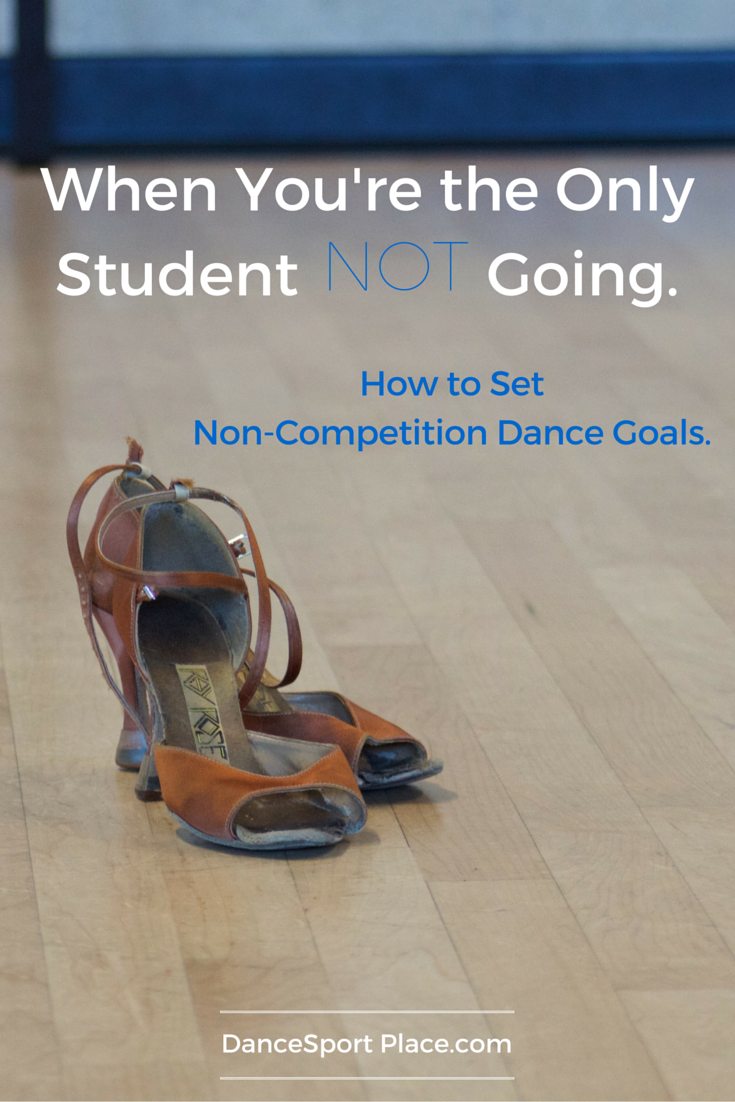Back in August, I handed out my tips for stretching your dance competition dollars, especially when you are the only student going to a pro-am ballroom competition with your teacher.
Now a few months later, I find myself feeling like the only student NOT going to competition. Competing in pro-am ballroom has gone from expensive to too expensive for me and I’m taking a forced hiatus.
In between searching for every last dollar in my budget and feeling sorry for myself that I just don’t have enough to compete, I started to feel adrift, like I was lost in ballroom wilderness.
Competitions had become important milestones for me in my ballroom journey.
They were a way to measure progress and determine where to go next. Competitions were the goals that I worked toward in each private lesson
and the reasons that motivated me to get my butt to the studio to practice on my own.

Goals are essential for any journey
They keep you motivated and accountable at the same time.
A goal is a challenge you set for yourself with a built-in reward for completing it.
Goals give you the “why” behind your actions. Ballroom dancing is no different, and competitions are great goals to work toward.
But as students, we’re not dancing or competing for a living, we’re doing it for the sheer JOY, and for the feelings of accomplishment and growth. We still work and live outside of the ballroom world, and sometimes that reality interferes with our ballroom fantasy.
After my competition budget had to be rerouted to other things, I found myself quickly spiraling down into a depressed funk. I could still afford my private lessons, but WHAT WAS THE POINT of taking all of those expensive lessons if you don’t get a chance to show off your stuff or test your skills?
Should I even continue dancing?
That last question was quickly answered with “OF COURSE!” but I recognized that I needed to find replacements for my competition goals in order to stay motivated and feel like I still had a purpose. I needed a new “why” that was more specific than “because I love dancing!”. If that was reason enough, I would be satisfied with social dancing.
I know I’m not the only one struggling to balance ballroom dreams and financial realities.
When you don’t have a specific event to work toward, it can also feel hard to justify the money spent on lessons.
To keep your dancing dreams alive and avoid getting lost in ballroom wilderness, talk with your teacher and set some non-competition dance goals. They should be goals that will challenge you, keep you engaged, and feel rewarding when you reach them. The goals should also be sufficient distraction from the competitions you’re not going to.
Here are some ideas for non-competition dance goals while you wait for the path to competition to
reopen.
1) Learn a new style.
Learning a new ballroom dance style requires a new and different focus compared to building on a style you have already competed in. To date, I have only competed in American Smooth.
With no upcoming competition that would require lessons to focus on Smooth, it’s a good time to start adding American rhythm or even Standard to my repertoire. And it will be months before I feel like any new style is “competition ready,” which means I won’t be itching to test them out on the floor any time soon.
2) Switch roles with your teacher.
If you’re a woman, learn to lead. If you’re a man, learn to follow!
Switching roles will completely confuse your brain, in a fun way, and give you a fresh perspective on what you’ve already worked on. You will also find that your dancing improves when you switch back to your normal role. If you ever toyed with the idea of teaching ballroom one day, being able to switch roles will be critical.
3) Review the syllabus.
From bronze to gold, the different levels of skill in ballroom require you to know different steps. If you get a sense of accomplishment from checking things off, go through the dance syllabus with your teacher and find out how much you actually know!
Depending on your level, this goal may not take long to achieve, but it’s another one that will benefit you in the future if you ever thought of becoming a teacher.
4) Enter a team match.
Although this goal still requires some expense, these mini in-studio competitions are a good alternative goal, if you have still have a little bit of money left in your competition budget. You still get to dance in a competitive setting, but team matches don’t carry the same high cost as the big competitions. You’ll also have the chance to get some feedback from a judge!
5) Perform at a practice party.
This goal will require cooperation from your studio’s owner/manager, but it’s worth a shot! Ask if you could perform some kind of solo or spotlight dance at one of your studio’s next parties.
You’ll get the thrill and challenge of performing in front of an audience without the extra cost of signing up for a showcase or recital. If your teacher is willing and able, the two of you could choreograph something new together, or you could dance one of your competitive routines as a
demonstration.
Have someone record your performance, so you have something to review and work on afterward with your teacher.
Although nothing quite matches the rush you get from going out on that ballroom competition floor, there are other possible goals to work on. It sucks to feel held back because of finances, but that doesn’t mean you can’t still feel accomplished in your dancing.
Don’t give up, and keep saving those pennies!






Thanks for the blog and a great way to get back into a positive mindset. I do think that pro-am needs a bit of an overhaul..not sure what that means exactly but I’m beginning to see fewer competitors on the floor and can’t help think that maybe more people are feeling the financial strain (something that most people don’t talk about so openly). I have no regrets for the past five years and I can never see myself “quitting”, but now I have to find balance
Thanks for sharing your insight, Victoria. Another interesting factor will be to see the path pro-am takes as the rest of the world begins to embrace it more. It would be good to find more options for pro-am, so dancers can enjoy the spirit of competition without going poor for their passion!
Even though this article was published awhile back, I found it at an appropriate time. I too am always torn with the very same issue. I don’t compete on a regular basis and only manage to do one or two a year, as not only my traveling fees, comp fees factor, but my Pro charges an enormous amount to dance and that does not get split if one or three of his students attend a comp. Not to mention, his travel and hotel stay. I always have considered myself the “poor” student in the group. I love dancing and have been involved for over 15 years, Pro am since 2007. I have learned so much since I moved to a major metropolis, 4th largest city in U.S and have definitely seen myself grow in my skills and technique. Dancing gives me a goal and such joy to create movement on the dance floor, but don’t know how much longer I can afford it. No competitor ever seems to discuss expenses and I assume every one I meet at comp makes six figure salaries.
I feel relieved to finally see someone speak about their financial challenges in competitive dancing as I always assumed I was one of the few. Thanks for sharing your experience.
You’re not alone! I do not make six figures and I budget every penny so I can compete. It’s not always easy to appreciate the few comps I can attend when I see other students doing three times as many. We’re all on our own journeys though. Comparison only causes pain and frustration, I’m sure you know. I hope you’re able to continue dancing for the joy! I’m glad the article was helpful to you, and thanks for your comment. 🙂 -Katie
Without a doubt, affording to compete can often be a challenge! I agree with Katie’s statement, that although it can discouraging to see other dancers compete more frequently than you, it’s important to not let that dissuade you from striving to your goals. You might want to also check into options that are less pricey than a regular competition, but will still offer a competition/performance setting, like a team match or showcase. Doing these smaller events will keep your performance skills sharp, so when you do save up to do the next big comp, you’ll be in peak condition.
I am in this exact situation at this very moment. All I want to do is compete but the financial aspect of it all is holding me back. To see other students going to competitions and I’m having to sit them out is really taking a toll on me. I’m in tears almost on a daily basis. Thank you for your article. I hope I can implement some of your tips. Dancingly yours!
I sincerely hope one or more of my tips will help you, Cindy! It’s so hard to feel like we’re being left out or excluded simply because we don’t have as much money as some of our fellow students. I think it makes us work harder though and appreciate every moment we do get on the competition floor! I’ll share a bonus tip with you: explore a different dance style. I just took my first hip hop class and had so much fun! I still got to dance and even perform a little as we learned the choreography. I think it helped my ego to step outside ballroom temporarily. So while everyone else is at the comp, think about checking out a dance class where no one even knows there is a comp!
Thank you so much for your advice Katie. I do think that the key for me is to try to distract myself in some way while a comp is going on. It’s a bit tricky to do though with so much social media and you seem to be bombarded with so many pics being posted on FB and Instagram. I love all the helpful tips you provide to help ease the disappointment of not being able to attend a comp. And I did read your article on ways to save for a comp. So with all this information at my hands, I think I will find a way to either 1) Go to the next comp or 2) Find another outlet to get immersed and distracted in!!!
Once again, thank you for all the advice Katie. It truly is helpful to hear that I’m not the only one feeling this way!!!!!
Best,
Cindy
It’s really hard to sit out when your heart is pulling you to dance floor! We hope some of Katie’s tips will help you get some dance gratification in the meantime. Don’t give up your dancing, though! It’s good for the mind, body and soul. Thanks for stopping by, Cindy.
Thank you Melissa! I feel like I was drawn to this article at the very moment I needed to see it. It’s been extremely difficult for me in the last few months or so in trying to find a way to attend a competition. Lots of tears indeed! I have acquired four ballroom competition dresses and they’re just sitting in my closet collecting dust. I’m waiting for that moment when I can bust them out and show them off on the competition floor! Thank you for reaching out to me! Cindy
Those dresses will have their day, Cindy! Keep up your personal practice along with your lessons–it will make all the difference when you get back onto the floor
Another tip I think I might start to employ myself is to leverage more advanced/competitive level group classes. I have recently had the fortune of taking lessons at a more competitive studio. I won’t say which one, in Canada, but when a top world class pro is teaching a workshop, I’m going to take it to supplement my privates..I watch the kids, young adults, and pros participate in these classes and I’ve decided not to be intimidated by joining in and working my technique… at a fraction of the cost…
This is a great opportunity for training, Victoria. Riccardo and Yulia do group classes at the studio where we teach when they are in town. What an unbelievable “value” to learn with the best dancers in the world at a group price. Dancers really should take advantage of this type of opportunity, if they have it. Thanks for sharing your tip!
Thanks for this article. I am not a competitive dancer, because of costs financially. However, my teacher that I do private lessons with has come up with new ways to challenge me. Also, I have taken lessons in dancing with my church, and doing that allowed some people of my church to notice my interest in dancing. This allowed one of my friends to realize I had a passion, and I am auditioning for church dinner theater which is next Fall. And Right now, I see that as my goal – to make that dinner theater dance troupe and also I constantly work on technique – which I am still do even though I do not compete because it makes me better – and I am a perfecitonist and always want to do everthing right, so her other goal is to help me to realize that NOT being perfect all the time is OK 🙂
That’s great that you’ve found another outlet for your dancing, Kristin. Your goal of not being such a perfectionist is a really good one. What’s perfect anyway?! The best dancers in the world are all different because they bring their own strengths and characteristics to their dancing. The journey of finding your own personal dance style is more rewarding then seeking “perfection”. Good luck with your dancing and thanks for you sharing your story!
Can you pick up an amateur partner? I used to compete Am/Am and EVERYTHING was a fraction of the cost of Pro/Am: the price of a single Pro/Am comp is the cost of 4 or 5 Am/Am comps, private lessons became half price, practicing was nearly free [minus floor time].
Finding an amateur partner is a fantastic way to save money and really improve! The trouble is, finding a partner can be difficult. If one can find a partner with like-minded goals and commitment, it is certainly a great way to go. Thanks for your comment!
Melissa, I *COMPLETELY* agree with you about finding someone with “like-minded goals and commitment”. In the long term, those two things can be a make or break for in partnership!